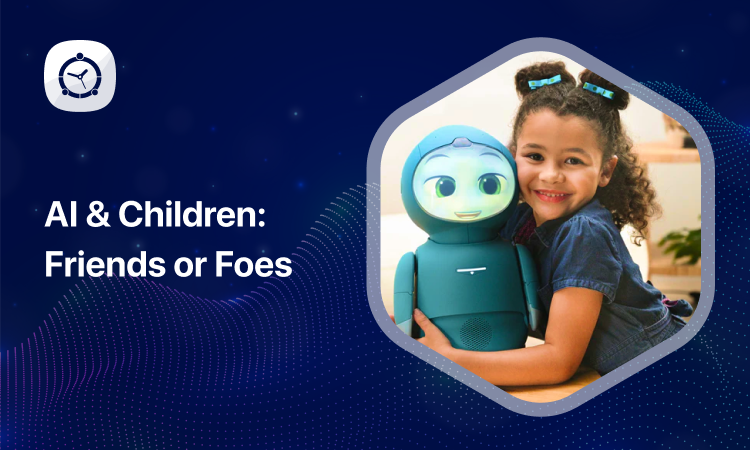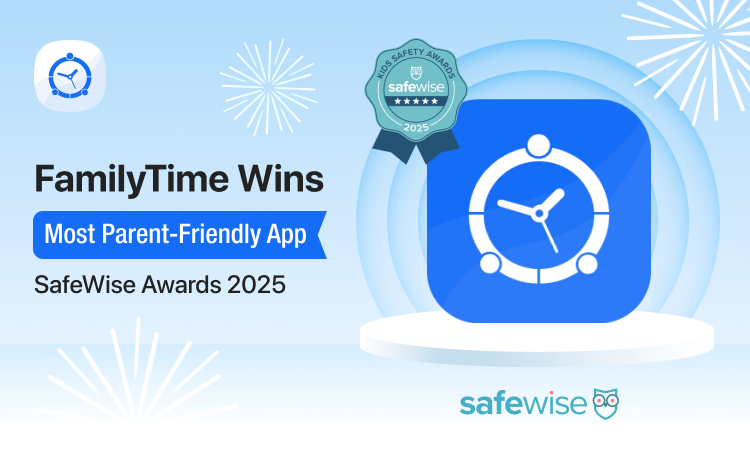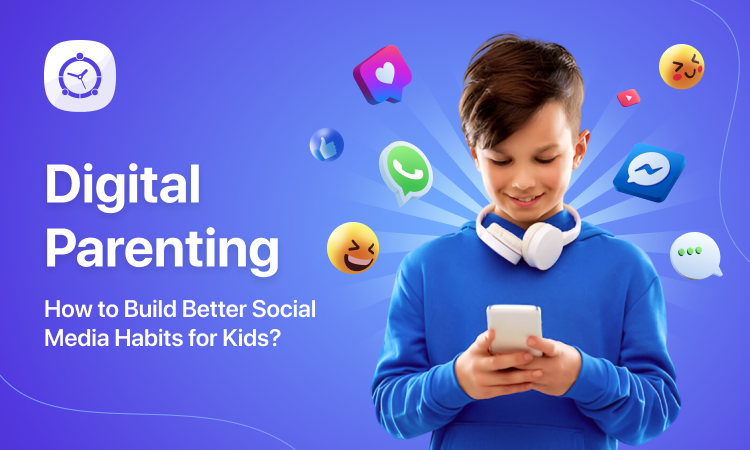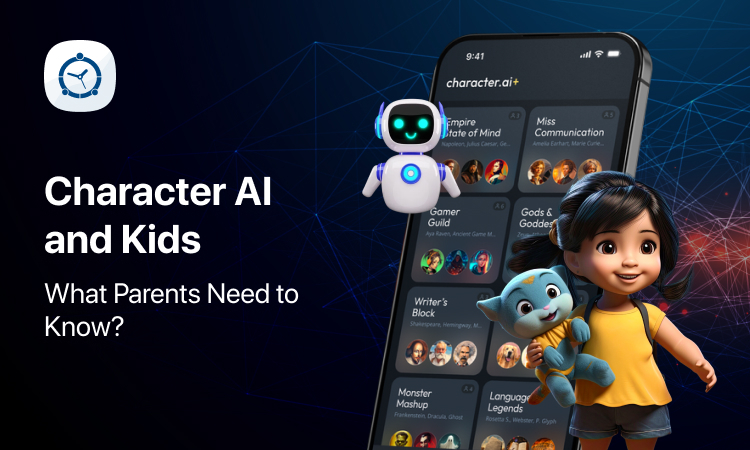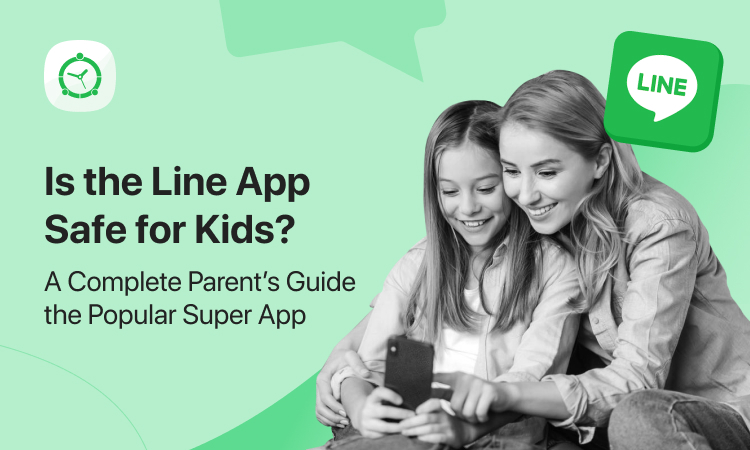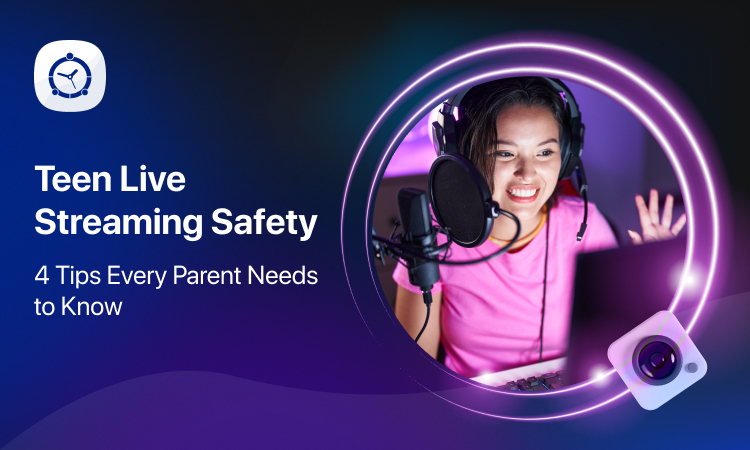Artificial Intelligence (AI) has undeniably simplified our lives in various ways. A single command, from smart homes to AI assistants often gets the job done. Like many other innovations, interacting with AI is straightforward, even for children. They have numerous opportunities to learn, accomplish basic tasks, access information, and more.
AI & children make a good team together and call for active digital parenting. However, the growing influence of AI also raises concerns for children’s safety. The ongoing AI revolution and its progress are taking us even further. We can now directly interact with AI models to complete various tasks or simply for entertainment.
AI models are no longer confined to workplaces or tech hubs; they are now integrated into social media apps like Snapchat. Interestingly, children are eager to embrace these features.
AI offers both utility and a degree of uncertainty for children. To explore the benefits and dangers of AI for children, let’s delve a bit deeper into its implications.
AI as a Friend – Learning & Entertainment
Imagine having a helper that can answer all your questions, like a super-knowledgeable friend. That’s AI! It is an invaluable resource for students, instantly answering their queries and helping them with their homework. For anyone with a curious mind, AI can be an incredible tool for discovering new information and expanding their knowledge.
AI isn’t just about answering questions; it can also make learning an enjoyable experience for children. Thanks to Artificial Intelligence, a plethora of educational apps and games adapt to each child’s skill level. This intelligent technology allows the app’s interface to adjust according to the user’s proficiency, ensuring a personalized learning journey. As your child learns and hones their skills, AI continues to adapt and evolve alongside them, creating a symbiotic learning relationship.
Special Needs are Taken Care of!
AI is incredibly beneficial for everyone, especially children with special needs. AI can provide valuable assistance to these children in various ways, such as aiding in reading and understanding. It can read aloud or even translate text into different languages. Additionally, AI can serve as a reminder for important tasks or appointments, much like a helpful friend would.
Where Can Things Go Wrong? – AI as a Potential Foe
While AI can undoubtedly offer significant assistance, it also has questionable aspects. You cannot deny AI risks.
Have you ever noticed that after searching for something online, you suddenly start encountering ads related to that topic everywhere? This phenomenon occurs due to AI tracking your online activities.
The same scenario applies to your child’s devices. AI constantly tracks your child’s personal information, collects it, and employs it for future training. Consequently, your child’s online activities are not entirely private and can be:
- Sold to advertisers
- Used in product development
- Employed in experimenting with new approaches
- Utilized to train AI models
- and more.
It’s crucial to remember that AI doesn’t possess inherent intelligence; rather, it’s an intelligence constructed from metadata, much of which is derived from users across the globe.
Snapchat’s “My AI” as a Potential Threat
Both adults and children are captivated by Snapchat’s ‘My AI’ feature. The concept of having a personalized AI that crafts filters to match your face or generates customized stickers is undeniably appealing. It creates an illusion of interacting with a friend, making it an engaging experience for children.
However, there’s a darker side to this seemingly delightful feature. ‘My AI’ collects significant data about your child’s face, preferences, location, and activities. Numerous users have reported experiencing unexpected and even unsettling interactions with the feature. It can sometimes display content that wasn’t requested or intentionally framed.
The primary concern here is the potential misuse of data and the erosion of privacy over time. Your child’s private data, conversations, and ideas could easily be harnessed or even exploited by AI. The feature or app could share sensitive information without your child’s consent.
Way Forward to Protect Your Children
While it’s undeniable that AI offers numerous potential benefits and will likely be an integral part of the future, it’s unrealistic to ask your children to completely avoid these tools, models, or apps. Nonetheless, you can ensure your children’s safety in several ways in this evolving landscape. Let’s explore these strategies:
Educate your children
Help your children grasp the basics of AI, its functions, and how it processes information. Equipping them with a foundational understanding of these concepts provides them with essential technical knowledge.
Develop an understanding of privacy.
Instill in your child the significance of data security and privacy. Make them aware of the potential risks associated with compromising their privacy.
Limit Information Sharing
Encourage your child to be cautious about the personal information they share with AI. Teach them to gauge what information is appropriate to share publicly and what should be kept private.
Review privacy settings
Despite AI’s growing presence, it offers some privacy control. Utilize privacy settings to limit the data AI can access on your device and define how that data can be used. Activate these settings on your child’s device to bolster their safety.
Employ Parental Controls
Parental control apps like FamilyTime are a powerful tool to enhance children’s safety. With these apps, you can guard your child’s digital environment and control app usage, content access, and information sharing.
FamilyTime goes beyond control, allowing you to thoroughly monitor your child’s activities and relationships. Everything is accessible, from messages to calls, search habits, device usage, and more. It’s a big step towards better digital parenting, and it ensures your child’s safety.
Wrap Up!
While there’s no doubt that AI can do wonders in our lives, the situation isn’t always straightforward and precise. Particularly for children, technology and AI don’t always equate to positive outcomes. As parents, it’s essential to both limit and monitor your child’s exposure to technology. By doing so, you can ensure their safety and enable them to experience the marvels of technology in the best possible manner.

